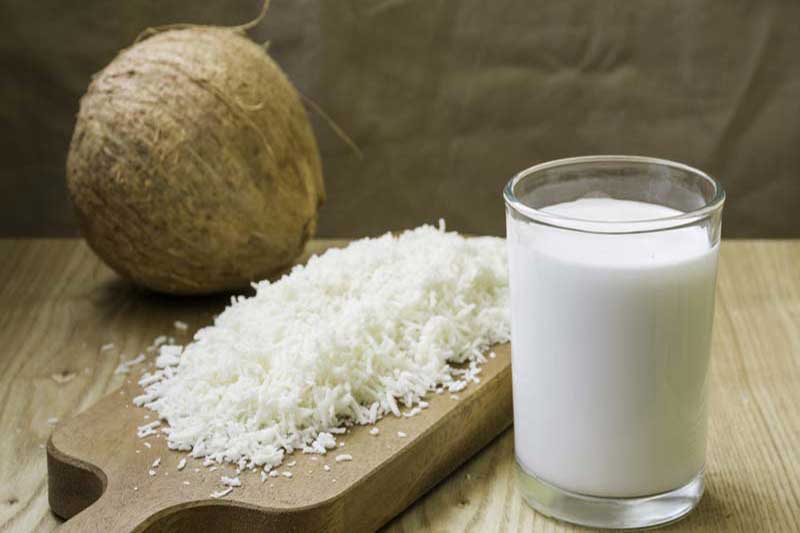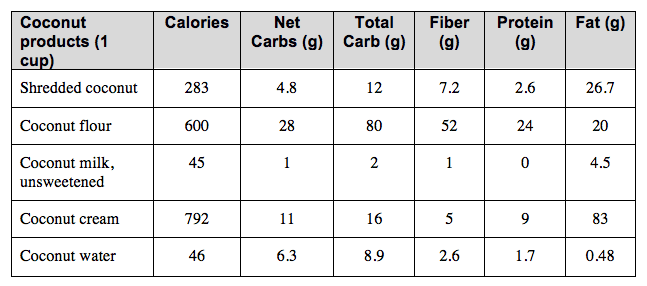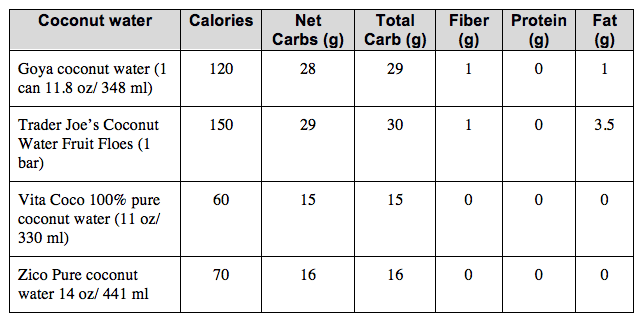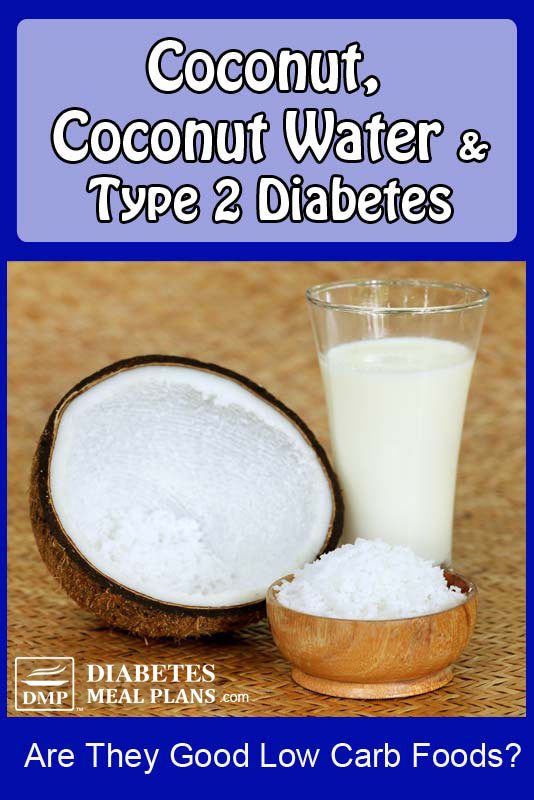Many of us have romantic, idealized views of coconut – think, a tropical island and a whole lot of vacation!
But of course, coconuts, along with all their byproducts are not just found in tropical holiday destinations, they can be found in modern day supermarkets (coconut flour, shredded coconut, coconut milk, coconut water, etc.).
Coconuts originated in India and Southeast Asia, and were eventually brought to the Americas. It’s actually believed that they got their name from the Portuguese word ‘coco,’ meaning ‘laughing face’ – because that’s what Portuguese sailors thought they looked like. :)
So when it comes to type 2 diabetes, how healthy is coconut and coconut water, in particular.

What are Coconuts and Coconut Water?
You may be wondering – are coconuts actually nuts?
Technically, the coconut meets the criteria for being a fruit, a nut, and a seed all at once!
Coconuts have an outer layer, a fibrous husk beneath that, and coconut ‘meat’ (the white stuff that we eat) inside.
Importantly, coconut water is not the same thing as coconut milk.
Coconut milk is the creamy, white liquid that comes from mature coconuts. It’s often used in rich dishes such as curries. Coconut water (which we’ll be focusing on in this article) comes from young coconuts.
Keep that in mind – the mature and the young coconuts produce different byproducts, which have different nutritional qualities.
Coconut Nutrition Facts
Coconut meat is moderately high in calories (¼ cup contains 71 calories), principally because of its high fat content – made up of medium-chain fats, otherwise known as coconut oil.
We’ve written about coconut oil over here and it’s an extremely healthy source of fat that provides many health benefits.
That same quarter cup of coconut meat contains around 6.5 to 7 grams of fat, 3 to 4 grams of carbohydrates, minimal protein, and around 2 grams of fiber.
Coconut’s high fiber content is one major benefit of the food. It contains both soluble (3·41 g/100 g) and insoluble (34·0 g/100 g) dietary fiber.
As you can imagine, those high amounts of fat and fiber mean that a small amount of coconut can keep you pretty satisfied for hours!
It terms of vitamins and minerals, coconut contains (per ¼ cup):
- 4% recommended daily amount (RDA) potassium
- 3% RDA phosphorus
- 3% RDA zinc
- 2% RDA magnesium
- 2% RDA iron
Take a look at a few of the nutrition facts for coconut products below.

Though coconut flour and coconut cream are higher in calories, these are often used in smaller portions.
Coconut flour is considered a low carb flour suitable to use within a diabetic diet.
Coconut Water Nutrition Facts
Coconut water can range in it’s nutritional makeup quite a bit, as you’ll see in the chart below.

Taking a look at the above chart you can notice a big difference in nutritional values. A typical can of coconut water is moderately low in calories (one 11.8 ounce can contains 120 calories) but is very high in carbohydrates – that same can contains 29 grams of carbs!
As anyone with diabetes knows (or at least should know), this amount of carbs, mainly in the form of simple sugars, is going to send your blood sugar levels soaring. So always check the labels to view the actual nutrition value, and check the ingredients list for additives.
The pure coconut water is much better, at around 15 to 16 grams of carbs, depending on brand and the amount you consume. Even 15 to 16 grams of pure carbohydrates is a lot to consume on its own, so it is recommended you go very easy on the coconut water.
Pure coconut water contains no fat, protein, or fiber.
In terms of vitamins and minerals, 100% pure coconut water contains (~per 11 oz):
- 49% RDA potassium
- 16% RDA sodium
- 15% RDA zinc
- 11% RDA magnesium
- 6% RDA phosphorus
- 4% RDA calcium
Coconutty Myths and Truths
Some people believe that coconut water is more hydrating than water itself. However, there’s absolutely no scientific proof of this, and drinking water hydrates you just fine without filling you up with sugar!

Research about Coconut, Coconut Water, and Diabetes
Studies in animals have found that mature coconut water has the power to lower blood glucose levels and increase antioxidant activity. However, keep in mind that most of the coconut water sold in stores today is not from mature coconuts, it’s from young coconuts.
In rat studies, coconut water has been found to help with lipid metabolism in those fed a high-cholesterol diet.
Proteins derived from coconut kernels have been found to lower oxidative stress associated with diabetes, along with lowering lipid levels.
As for coconut itself, it’s been shown to have blood sugar-lowering properties and antioxidant effects, with very few negative side effects!
So are Coconut and Coconut Water Good for People with Diabetes?
Coconut and its byproducts such as coconut flour, shredded coconut, desiccated coconut, coconut milk, coconut cream, coconut flakes, etc., are perfectly healthy for diabetics to eat, and can form a part of any nutritious diabetic diet.
Just be aware of the higher calorie content of some coconut products.
Coconut water, as discussed above, does have some nutritional benefit; however, due to its higher carb content, it should be consumed in moderation, if at all.
You should also read the labels and nutrition facts to check the carb content and ingredients in each individual item. Unsweetened coconut products in their natural form are obviously the best choice.
Please pin, tweet or share this info to help others. Thanks!

Victor Àugusto del Carmen Alfonso Contreras'.
I like to know the difference between a young coconut and a mature coconut,in reference to the coconut water. Also I noticed how easy is to control the crazy Type 2 Diabetes when you drink the coconut delicious water from the coconut itself.Also by chewing on the meat lower the index of glucose. Please send me more information.I will be very grateful.
Emily - Dietitian (MS, RD)
Remember, coconut water contains simple carbohydrates and therefore can raise blood sugar – regardless if it is from young or mature coconuts.
Adoga Augustine
This information really helped me as a diebitic patience, please I sincerely need your medical advice from time to time how to keep my self in order to regain my health challenges. Than you
Emily - Dietitian (MS, RD)
Hi Adoga- for specific medical advice we always recommend you speak with your doctor. We are more than happy to help answer any general questions about food, blood sugar levels, or medication. Just drop another comment if you have any questions at this time that we may be able to help with.
Mathias zulu
Am a man of 53years not fat,Am slim but I am a diabetes type 2 how risk ist to handle
Emily - Dietitian (MS, RD)
You’ve come to the right place if you’re looking to better handle your type 2 diabetes. Based on the science we’ve reviewed, we encourage a low carbohydrate diet for better blood sugar/A1c control. Here is an extensive list of many diabetes friendly foods to get you started.